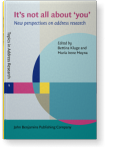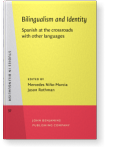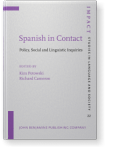Verónica Loureiro-Rodríguez
List of John Benjamins publications for which Verónica Loureiro-Rodríguez plays a role.
2019 Brocatives: Self-reported use of masculine nominal vocatives in Manitoba (Canada) It’s not all about you: New perspectives on address research, Kluge, Bettina and María Irene Moyna (eds.), pp. 355–372 | Chapter
This apparent-time study presents the results of a self-report survey adapted from Kiesling (2004) on the use of man, dude, bro, and brah [brʌ] /bruh [brə:] in the Canadian province of Manitoba. Our analysis considers social and identity variables (i.e., age, speaker and addressee gender,… read more
2017 Y yo soy cubano, and I’m impatient : Frequency and functions of Spanish switches in Pitbull’s lyrics Spanish in Context 14:2, pp. 250–272 | Article
This article examines Cuban-American rapper Pitbull’s use of Spanish in his seven English albums, drawing from the literature on lyrical code-switching and Sarkar and Winer’s (2006) socio-pragmatic framework for the analysis of multilingual code-switching in Quebec rap. It was found that… read more
2015 “Is that what I sound like when I speak?”: Attitudes towards Spanish, English, and code-switching in two Texas border towns Spanish in Context 12:2, pp. 177–198 | Article
This study investigates language attitudes towards English, Spanish and code-switching in two Texas border cities (Laredo and Edinburg) by means of a matched guise test with three attribute dimensions (solidarity, status, and personal appeal). It was found that there were no significant overall… read more
2008 3. Conflicting values at a conflicting age: Linguistic ideologies in Galician adolescents Bilingualism and Identity: Spanish at the crossroads with other languages, Niño-Murcia, Mercedes and Jason Rothman (eds.), pp. 63–86 | Article
2007 7. Are Galicians bound to diglossia? An analysis of the nature, uses and values of standard Galician Spanish in Contact: Policy, Social and Linguistic Inquiries, Potowski, Kim and Richard Cameron (eds.), pp. 119–132 | Article
Galician is a minority Romance language spoken in the northwestern Spain, where it shares co-official status with Spanish. Over the centuries, the status of Galician has changed due to the political situations within Spain, ultimately affecting speakers' attitudes and the use of both languages.… read more




